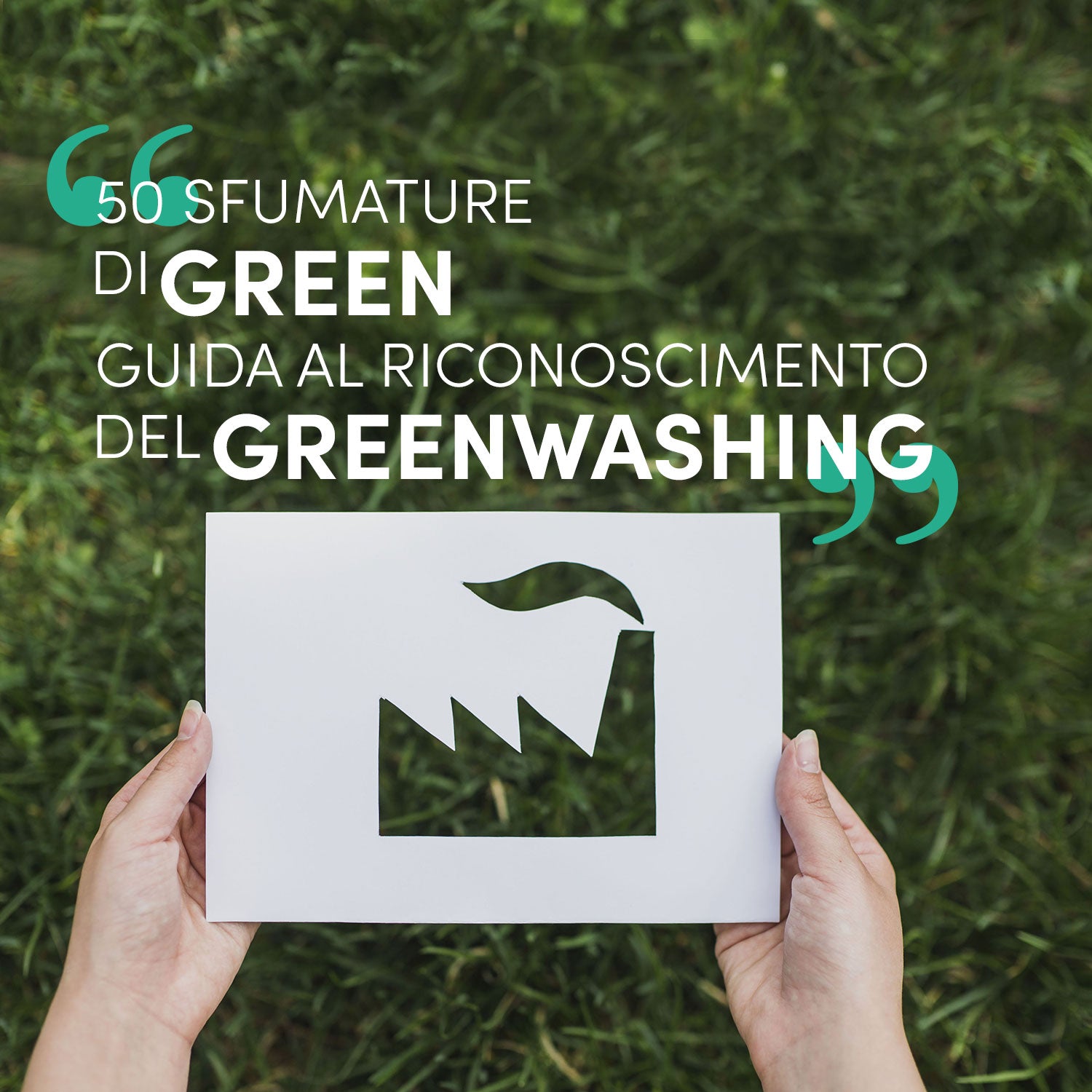50 shades of Green - Guide to green washing recognition

What is the color of sustainable living?
Surely you are thinking of a green, the green of freshly cut meadows, of pristine woods, there are a thousand shades of this color.
Now add a little gray and voilà, here is the color of greenwashing, a dark color, indefinite, with a bitter aftertaste that smells of rancid.
Greenwashing has the color of "industrial" vegetables , beautiful and perfect outside, but when you bite into them have already gone bad.
Greenwashing has the bitter taste of a lie, of the truth hidden under a blanket of dust blown into your eyes.
Greenwashing is shimmering and full of sequins, sequins sewn onto a worn and moth-eaten dress.
Greenwashing is the false promise of a green future, where we will all run through flowery meadows breathing crystal clear air, where a refinery lies beyond the hill.
But let's go in order:
What is greenwashing?
Sustainability, a word that is so fashionable.
You hear it in all sorts of ways, in all releases. The biscuit that makes you a superhero is sustainable, the product that makes your home shine and the car that takes you from place to place along empty streets and enchanting landscapes.
They are all sustainable, it's a pity that the word "sustainable" focuses only on one detail of the product:
- the biscuit has only a green packaging while the wheat with which it is made contains glyphosate
- there is bicarbonate in the cleaning product, but only at 2%
- the fuel the car goes with is not green by definition
This is what greenwashing is, facade ecology that makes you believe you have bought something absolutely green, while in reality the product is not at all - or almost - sustainable.
Misappropriation of virtue
One of the most beautiful definitions of greenwashing is given by Valentina Furlanetto, in her "The industry of charity - the hidden face of charity gives stories and unpublished testimonies"
«A form of embezzlement of virtues and of eco-sensitive qualities to win the favor of consumers or, worse, to make people forget their bad reputation as a company whose activities compromise the environment »
Greenwashing means selling your products and boasting business virtues hiding them under a green patina that confuses without having the merits.
How did the term greenwashing come about?
Greenwashing is literally green washing, but where does this term come from?
We are in the 1980s and hotel companies are urging users to decrease the consumption of towels with the excuse of reducing the environmental impact deriving from their washing.
The real motivation behind this pseudo-environmentally friendly invitation is that hotel chains want to save on laundry expenses.
Hence greenwashing, coined in 1986 by Jay Westerveld who was the first to denounce this practice.
Translated: the company that practices greenwashing spends more money to communicate that it is eco-friendly than investing to concretely minimize its own environmental impact.
How to recognize greenwashing

Today there are many companies that claim to be sustainable and to create miraculous and fabulously green products.
But it is precisely this term - green - and its synonyms that should set off an alarm bell.
What are the worst practices that companies that practice greenwashing use?
I thought it was love, but it was a gig
Green, sustainable, eco-friendly, they are like the words "I love you": if supported by facts they open up wonderful worlds, otherwise they are just words, empty like the stairwell in a six floors building.
Consistent like a general talking about peace with a rifle in his hand
There must be consistency between the product and the Company's behavior: companies that advertise green products made by exploiting workers are not sustainable.
How to defend yourself from greenwashing

Often the marketing of companies that practice greenwashing lacks too much enthusiasm: to try to sell more, it rides the green wave of the moment and confuses sustainable with not excessively polluting .
But there are also examples of fraudulent greenwashing , where blatantly false messages are conveyed to the world of sustainability.
This is the case with those companies that produce polluting products and mask them with non-existent certifications, misleading words and images .
Why greenwashing is a problem

The problems of greenwashing are basically two:
- the first, the most obvious one: to induce users to purchase by leveraging false assumptions of sustainability
- the other, more subtle: once deceived, the consumer will increasingly tend to be wary of any message of sustainability , even when truthful.
So how to recognize the companies that make sustainability the real way of living and working, beyond words?
The secret is to stay with an open and critical mind, being able to read attitudes beyond words and labels beyond the packaging.
Being sustainable

Which companies are truly sustainable?
Being sustainable is not just a word, but a practice that permeates the entire working life.
Being sustainable means putting people at the center: respecting workers' rights , creating stimulating work environments and personal growth, taking care of the people who will use the product, create for them systems designed for psychophysical well-being, safe, non-toxic and recyclable.
Being sustainable means studying products that produce real well-being in people, using sustainable materials, using a production system with low environmental impact.
Being sustainable means putting into practice a 'Business ethics that does not remain only on paper.
Find out what Sustainability is in Rippotai.




